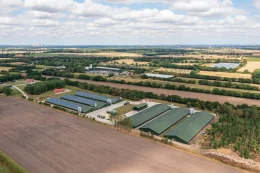
Deforestation
In addition, Pilgrim's Europe Chicken, Pilgrim's Europe Pork, and Pilgrim's Europe Prepared Foods have existing commitments to ensure deforestation and conversion free soy (soya) across their targeted supply chains. Further information on progress and policy requirements are available on the Pilgrim’s Europe website.
We are proud members of a number of working groups around deforestation and how we can work as a UK and Europe industry to drive progress on this important topic. We have signed the U.K. Soy Manifesto and the Cerrado Manifesto Statement, and we support the Amazon Soy Moratorium. We also work closely with non-governmental organizations (NGOs) and advisory groups to educate and inform policy makers across the globe.
Deforestation
In addition, Pilgrim's Europe Chicken, Pilgrim's Europe Pork, and Pilgrim's Europe Prepared Foods have existing commitments to ensure deforestation and conversion free soy (soya) across their targeted supply chains. Further information on progress and policy requirements are available on the Pilgrim’s Europe website.
We are proud members of a number of working groups around deforestation and how we can work as a UK and Europe industry to drive progress on this important topic. We have signed the U.K. Soy Manifesto and the Cerrado Manifesto Statement, and we support the Amazon Soy Moratorium. We also work closely with non-governmental organizations (NGOs) and advisory groups to educate and inform policy makers across the globe.
Deforestation
In addition, Pilgrim's Europe Chicken, Pilgrim's Europe Pork, and Pilgrim's Europe Prepared Foods have existing commitments to ensure deforestation and conversion free soy (soya) across their targeted supply chains. Further information on progress and policy requirements are available on the Pilgrim’s Europe website.
We are proud members of a number of working groups around deforestation and how we can work as a UK and Europe industry to drive progress on this important topic. We have signed the U.K. Soy Manifesto and the Cerrado Manifesto Statement, and we support the Amazon Soy Moratorium. We also work closely with non-governmental organizations (NGOs) and advisory groups to educate and inform policy makers across the globe.
Human Rights
Our facilities operate according to applicable labor and human rights laws. We uphold rigorous internal policies and programs designed to further protect and serve our team members. Aligned with our efforts to uphold ethical business practices, we maintain a zero-tolerance policy towards child labor and forced labor.
Our domestic and global supply chains are complex, and we acknowledge the potential risks associated with them. We understand that the agricultural and food production sectors can be vulnerable to modern slavery and human trafficking due to factors such as seasonal labor, subcontracting, and geographical remoteness. To mitigate these risks and remediate issues of concern, we have built partnerships with suppliers while promoting integrity and transparency in our products and services.
Guided by our Global Code of Conduct for Business Associates, we also maintain an open dialogue with our suppliers on issues involving respect for the environment, human rights, and national and local labor laws. Through this code, we strive to ensure that our suppliers are compliant with applicable laws and regulations. Additional requirements then vary by JBS business unit and region. For example, Pilgrim’s Europe complies with the provisions of the UK's Modern Slavery Act 2015 and the duty it places on businesses to disclose publicly the steps they are taking to tackle forced labor and human trafficking. We regularly review and improve our practices through effective due diligence and risk assessment, raising awareness of modern slavery and collaborating to protect the most vulnerable groups of people.
At Pilgrims Europe, we recently published the UK poultry industry’s first-ever Human Rights Impact Assessment. In partnership with a key customer, we commissioned a third-party assessment of our integrated supply networks. By collaborating across the sector, we are proactively identifying and addressing potential human rights challenges at every stage – setting a new standard for ethical and sustainable practice.
A Human Rights Impact Assessment is a process for identifying, understanding and assessing the potential or actual adverse impacts of a business project or activity on the human rights of those affected. It aims to ensure that businesses respect human rights and address any potential negative impacts they might cause or contribute to.
Human Rights
Our facilities operate according to applicable labor and human rights laws. We uphold rigorous internal policies and programs designed to further protect and serve our team members. Aligned with our efforts to uphold ethical business practices, we maintain a zero-tolerance policy towards child labor and forced labor.
Our domestic and global supply chains are complex, and we acknowledge the potential risks associated with them. We understand that the agricultural and food production sectors can be vulnerable to modern slavery and human trafficking due to factors such as seasonal labor, subcontracting, and geographical remoteness. To mitigate these risks and remediate issues of concern, we have built partnerships with suppliers while promoting integrity and transparency in our products and services.
Guided by our Global Code of Conduct for Business Associates, we also maintain an open dialogue with our suppliers on issues involving respect for the environment, human rights, and national and local labor laws. Through this code, we strive to ensure that our suppliers are compliant with applicable laws and regulations. Additional requirements then vary by JBS business unit and region. For example, Pilgrim’s Europe complies with the provisions of the UK's Modern Slavery Act 2015 and the duty it places on businesses to disclose publicly the steps they are taking to tackle forced labor and human trafficking. We regularly review and improve our practices through effective due diligence and risk assessment, raising awareness of modern slavery and collaborating to protect the most vulnerable groups of people.
At Pilgrims Europe, we recently published the UK poultry industry’s first-ever Human Rights Impact Assessment. In partnership with a key customer, we commissioned a third-party assessment of our integrated supply networks. By collaborating across the sector, we are proactively identifying and addressing potential human rights challenges at every stage – setting a new standard for ethical and sustainable practice.
A Human Rights Impact Assessment is a process for identifying, understanding and assessing the potential or actual adverse impacts of a business project or activity on the human rights of those affected. It aims to ensure that businesses respect human rights and address any potential negative impacts they might cause or contribute to.
Human Rights
Our facilities operate according to applicable labor and human rights laws. We uphold rigorous internal policies and programs designed to further protect and serve our team members. Aligned with our efforts to uphold ethical business practices, we maintain a zero-tolerance policy towards child labor and forced labor.
Our domestic and global supply chains are complex, and we acknowledge the potential risks associated with them. We understand that the agricultural and food production sectors can be vulnerable to modern slavery and human trafficking due to factors such as seasonal labor, subcontracting, and geographical remoteness. To mitigate these risks and remediate issues of concern, we have built partnerships with suppliers while promoting integrity and transparency in our products and services.
Guided by our Global Code of Conduct for Business Associates, we also maintain an open dialogue with our suppliers on issues involving respect for the environment, human rights, and national and local labor laws. Through this code, we strive to ensure that our suppliers are compliant with applicable laws and regulations. Additional requirements then vary by JBS business unit and region. For example, Pilgrim’s Europe complies with the provisions of the UK's Modern Slavery Act 2015 and the duty it places on businesses to disclose publicly the steps they are taking to tackle forced labor and human trafficking. We regularly review and improve our practices through effective due diligence and risk assessment, raising awareness of modern slavery and collaborating to protect the most vulnerable groups of people.
At Pilgrims Europe, we recently published the UK poultry industry’s first-ever Human Rights Impact Assessment. In partnership with a key customer, we commissioned a third-party assessment of our integrated supply networks. By collaborating across the sector, we are proactively identifying and addressing potential human rights challenges at every stage – setting a new standard for ethical and sustainable practice.
A Human Rights Impact Assessment is a process for identifying, understanding and assessing the potential or actual adverse impacts of a business project or activity on the human rights of those affected. It aims to ensure that businesses respect human rights and address any potential negative impacts they might cause or contribute to.

Responsible Business Policies
Our policies reflect our commitment to ethical integrity and social consciousness, actively supporting our company's pursuit of a sustainable ethos that creates a positive impact on both our community and the environment.
Responsible Business Policies
Our policies reflect our commitment to ethical integrity and social consciousness, actively supporting our company's pursuit of a sustainable ethos that creates a positive impact on both our community and the environment.
Responsible Business Policies
Our policies reflect our commitment to ethical integrity and social consciousness, actively supporting our company's pursuit of a sustainable ethos that creates a positive impact on both our community and the environment.


